In the News–Leadership & Strategy
5/31/18: Ambien, Roseanne and company reputation
Eve Tahmincioglu, Directors & Boards, May 31, 2018

This week the news has been dominated by a racist tweet shared by TV sitcom star Roseanne Barr. And in an attempt to shift blame, Barr blamed the drug she claimed she was taking, Ambien. In a rare move, the Ambien’s manufacturer, Sanofi, took to social media with its own tweet:
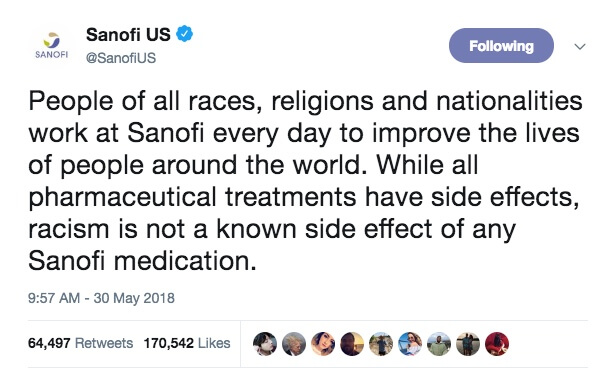
Should companies weigh in on things like this? Should such decisions be a board issue?
“I think the statement by Sanofi ranks as the all-time best corporate quote/tweet of the century,” says Davia Temin. “They distinguished their brand and their company in the mind of the public for all eternity, and did the right thing to boot. A master stroke.” […read more]
Why You Should Serve on a Board Now
Jan Alexander, Robb Report’s Muse, May 29, 2018
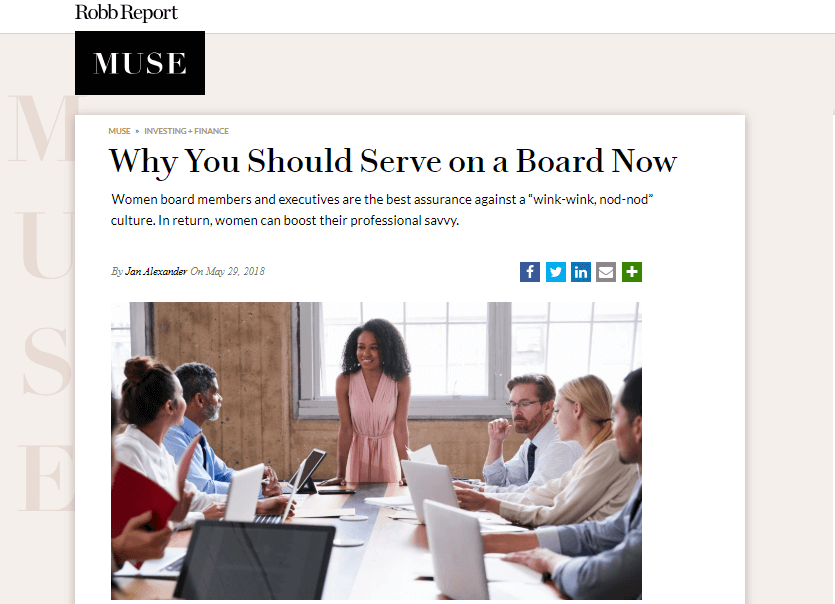
If you follow the news of workplace sexual misconduct—and who doesn’t these days?—you’ve no doubt heard that investors in any number of companies are clamoring for more women on the board of directors. There are two great reasons for highly accomplished women to serve on the boards of corporations both large and small. One reason is that they need you—and not just because of Me Too. The other reason to serve on a board is that the experience will do a lot for your professional savvy, even when you’re at the top of your game, which you pretty much have to be.
Charges of sexual harassment or any kind of discrimination are a risk to a company’s reputation and therefore its shareholder value—and women board members and executives are the best assurance against a “wink-wink, nod-nod” culture, as Davia Temin puts it. Temin has been advising corporations about how to avoid becoming “Weinstein Co. 2.0“, but she says boards also need women because “some of the smartest and most thoughtful governance is being done by companies that have more women on their boards.” […read more]
Paying for Trump Access Backfires Against Boards
Tony Chapelle, Agenda, May 18, 2018

Details continue to emerge about consulting deals that Donald Trump’s personal attorney Michael Cohen sought after the 2016 election in return for perspective on the incoming president’s viewpoints. As the plot twists get more labyrinthine, some governance observers say companies that paid Cohen could suffer more reputational damage in the weeks ahead.
Still, even with the payments out in the open, the companies — and boards, by extension — have faced questions about flat-footed responses to the payments’ disclosures, and why the companies made internal changes only after the payments were made public.
“These companies tended to get their responses correct the second time, not the first,” explains Davia Temin, who heads a public relations and crisis management firm, Temin and Company. “By now, you’d think they’d get it right the first time. Own it, apologize, put in fixes and then move forward quickly.” […read more]
Elon Musk got bored — and shareholders took the hit
Jena McGregor, The Washington Post, May 4, 2018

Elon Musk may have said what many frustrated chief executives — eager to talk about big visions or new strategies rather than answer questions about capital expenditures — dream of saying in response to financial analysts’ wordy questions: You’re boring. Your questions are dull. Next.
But that doesn’t mean they say it — or would ever be advised to. Yet in Tesla’s epic quarterly earnings call Wednesday, Musk did just that.
Even if Musk is known for his unconventional approach, that doesn’t mean he has to be that way in every circumstance, said Davia Temin, a communications and management coach on leadership issues.
“If your personal brand is as an iconoclast, there’s a tendency to want to be seen as an iconoclast on everything, but that’s not what really works,” she said. “You want your product to be the thing that stands out. Not your demeanor on an earnings call.” […read more]
Boy Scouts to Drop ‘Boy’ From Name of Main Scouting Program
Valerie Bauerlein, The Wall Street Journal, May 2, 2018
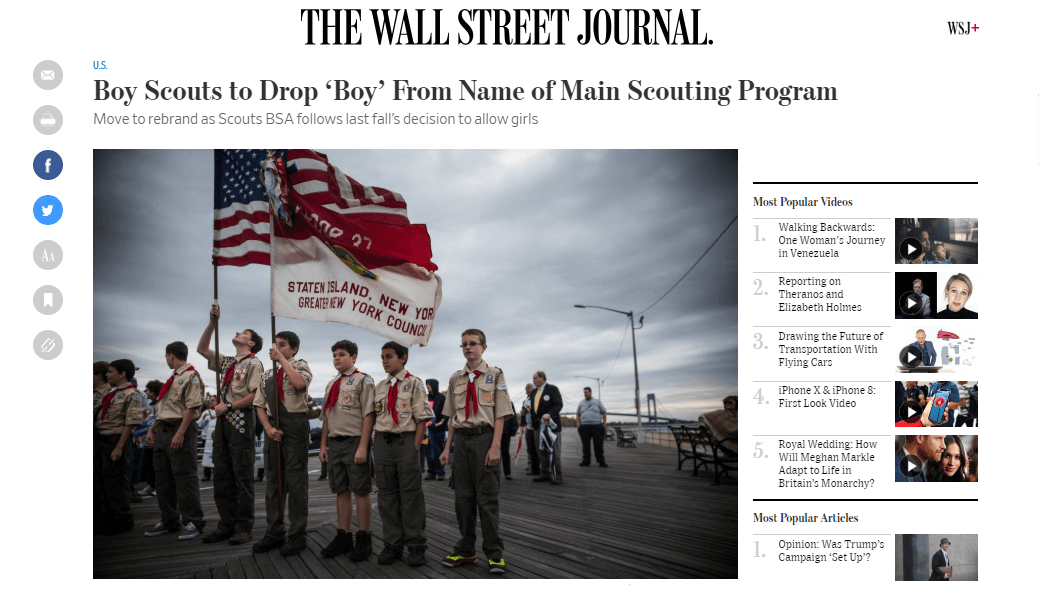
The Boy Scouts of America is changing the name of its marquee scouting program to reflect last fall’s historic decision to include girls. The Boy Scouts program for children aged 11 to 17 will lose the “boy” and be renamed Scouts BSA, effective in February of next year.
The rebranding announced Wednesday sets the century-old organization in direct competition with the Girl Scouts of the USA for a membership base that has been dwindling for decades.
Girl Scout alumna and volunteer Davia Temin said the organization must fight back aggressively against attempts to poach members. “They are executing on a hostile takeover, not just for the organization, for the girls of America.” […read more]
#MeToo Now Means Business
Avivah Wittenberg-Cox, Forbes #BigBusiness, April 30, 2018
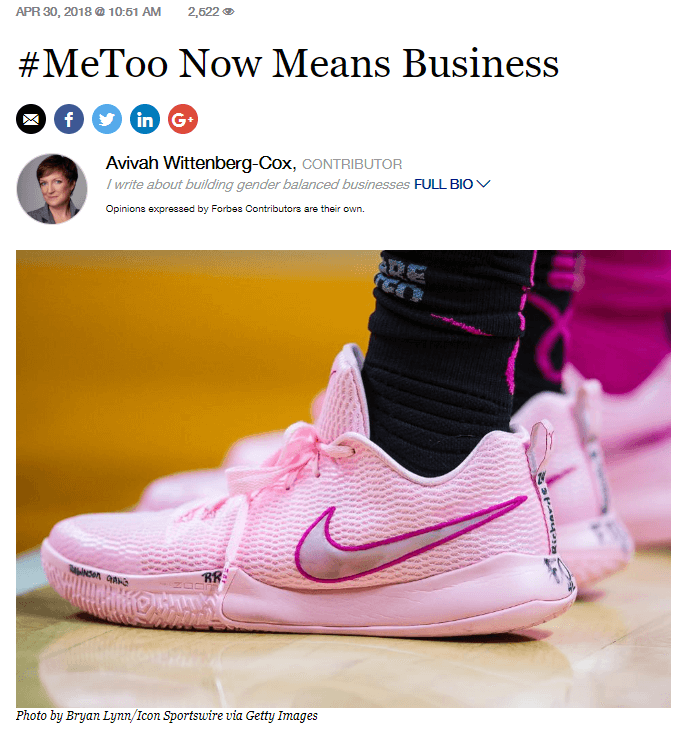
Everyone asked whether the #MeToo movement storming through the political and media worlds would spread into business. Nike has explosively answered. A brand admired for its women’s empowerment messages, diversity and corporate social responsibility has just delivered a cautionary tale of leaders contradicting the corporate line. Over the past month, the company has fired half a dozen male senior executives for “conduct inconsistent with Nike’s core values and against our code of conduct.”
Not surprising that a group of Nike employees took things into their own hands and invited colleagues to respond to a survey about sexual harassment. Since the results were delivered to the CEO in March, six senior executives have left or soon will. Nike will now be in full crisis mode and will want to proactively execute the 15-point plan laid out by crisis management expert Davia Temin. […read more]
Hawaii’s Investment Chief Got Fired. Then the Gossip Started.
Leanna Orr, Institutional Investor, April 23, 2018
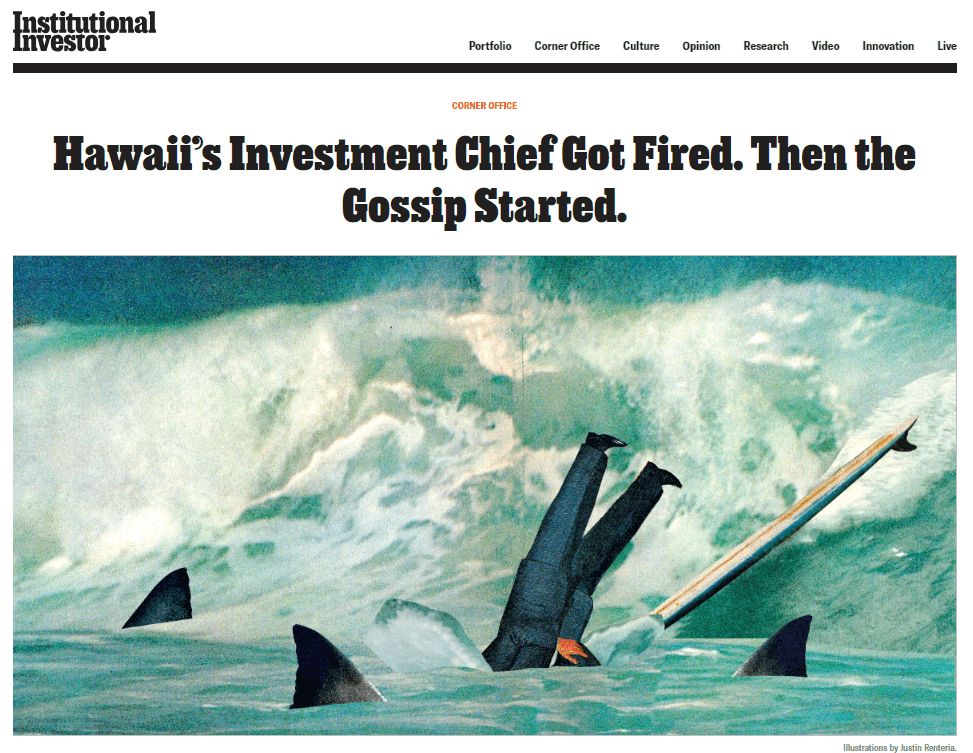
Firing the chief investment officer was the final order of business at the Hawaii pension board’s regular meeting on February 12. CIO Vijoy Chattergy was blindsided, insiders say. After seven years with the organization, Chattergy was told by his bosses that Monday that he was done, effective immediately.
When the news broke, people were just asking, ‘What happened? What did he do?'” By the time Chattergy’s ouster was hot industry gossip coast to coast — that is, within days — it was no longer a mystery. The narrative took hold that Chattergy had blown up Hawaii’s pension fund with a risky bet turned bad, then lost his job over it.
ERS executive director Thomas Williams initially refused to discuss the situation, though ultimately he notified the staff by email. Williams said what an organization’s leader should after executive upheaval, according to crisis PR consultant Davia Temin. He just did it a month too late.
“People are let go all the time,” says Temin, who reviewed the timeline and the documents associated with Chattergy’s ouster. “Whether the reasons are pretty benign or more egregious, the best practice is to act with the most elegance possible. And that means you allow someone their dignity as they leave,” she notes. “You don’t malign them or allow them to be maligned by doing and saying nothing, by keeping it a mystery. People will fill in that huge void with something far worse than reality — it’s human nature.” […read more]
CMO Today: Omnicom’s Clients Unbunde Digital Buys; Starbucks Shuts Stores For Racial-Bias Training; YouTube Addresses Creators
Lara, O’Reilly, The Wall Street Journal’s CMO Today, April 18, 2018
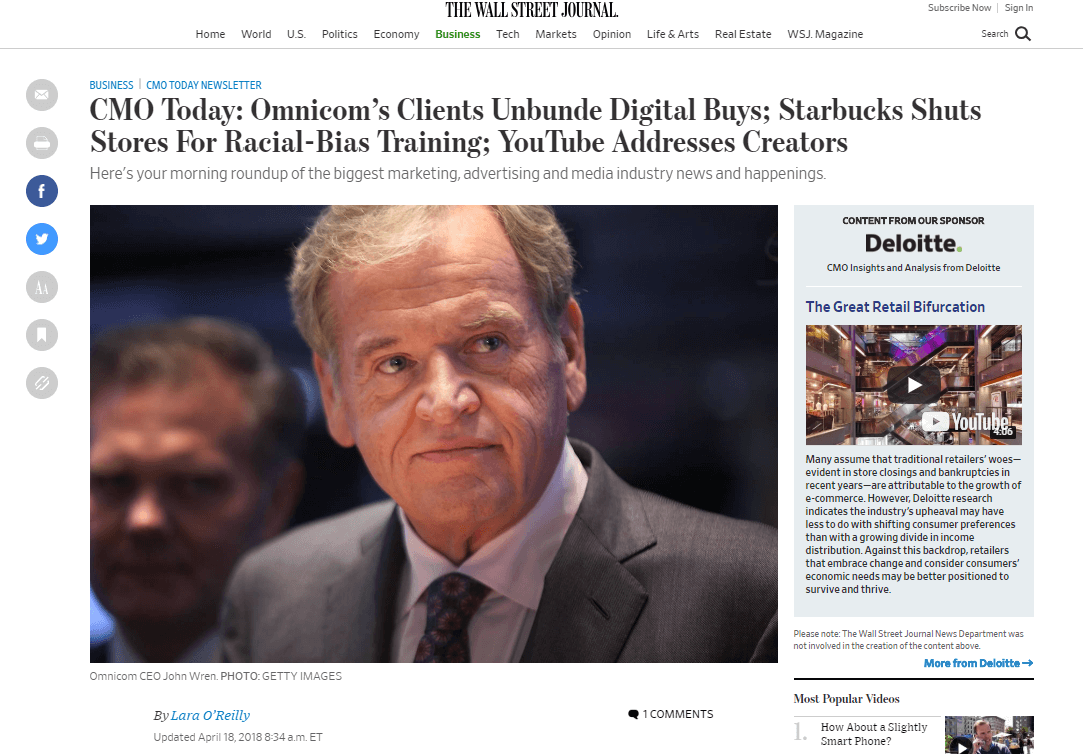
Starbucks made headlines this weekend after finding itself at the receiving end of a backlash when two black men were arrested at a downtown Philadelphia location. On Tuesday, they announced they will close all their company-owned U.S. stores on the afternoon of May 29 for racial-bias training, a move that some might compare to when Chipotle closed its stores to hold a national staff meeting about food safety.
But in Starbucks’ case, the company isn’t just applying a Band-Aid to an unraveling crisis, but defining best practice and a leadership position, according to Davia Temin. “Starbucks is defining a new level of seriousness in crisis response. It is a unique step—not one right out of some PR playbook—that both feels and appears to be honest and real.” […read more]
Leadership at the Crossroads Part 3: Courage to Speak Boldly When it Counts.
Gloria Feldt, The Sum – The Meaning of This Week, April 2, 2018

This article’s author asks readers whether they plan to delete their Facebook accounts in the wake of the controversy that threatened to unseat the social media giant. She also looks to Davia Temin’s Forbes post about what Mark Zuckerberg should have done and said.
“Facebook has been larger than life in our worlds for over a decade,” said Davia Temin. “We have trusted it enough to bring it into our homes and bedrooms, our commutes and workplaces, our friendships and our families until it has almost reached ubiquity. So Facebook’s responses to such a larger-than-life issue as this — the possible dissolution of our sovereign decision-making process — must be bigger than life, too. And far, far better.” […read more]
America’s Leadership Crisis: Davia Temin
Richard Davies, How Do We Fix It?, March 30, 2018
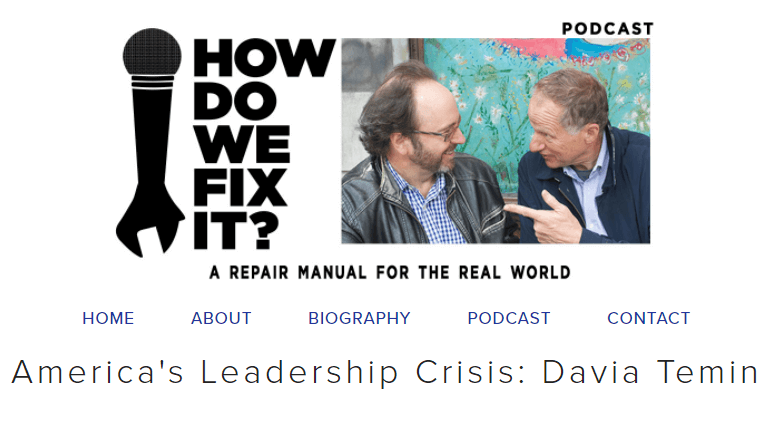
With turmoil and never-ending drama in the White House, and record numbers of departures from top levels of the Trump Administration, it is safe to say that America is facing a leadership crisis.
This episode’s guest, Davia Temin, looks at how leaders can avoid the mistakes and embarrassment that could ruin their reputation, lead to their downfall and cause their employees and associates great harm.
She speaks from a place of deep experience and passion about the crucial importance of ethics, honesty and diversity, as well as the need for leaders to communicate quickly and clearly, especially in times of crisis. We learn about the do’s and don’ts of crisis communications as well as the benefits of coaching and training. […read more]
More News Articles



